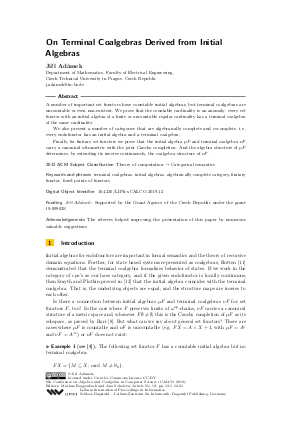On Terminal Coalgebras Derived from Initial Algebras
Author Jiří Adámek
-
Part of:
Volume:
8th Conference on Algebra and Coalgebra in Computer Science (CALCO 2019)
Part of: Series: Leibniz International Proceedings in Informatics (LIPIcs)
Part of: Conference: Conference on Algebra and Coalgebra in Computer Science (CALCO) - License:
 Creative Commons Attribution 3.0 Unported license
Creative Commons Attribution 3.0 Unported license
- Publication Date: 2019-11-25
File

PDF
LIPIcs.CALCO.2019.12.pdf
- Filesize: 493 kB
- 21 pages
Document Identifiers
Subject Classification
ACM Subject Classification
- Theory of computation → Categorical semantics
Keywords
- terminal coalgebras
- initial algebras
- algebraically complete category
- finitary functor
- fixed points of functors
Metrics
- Access Statistics
-
Total Accesses (updated on a weekly basis)
0Document
0Metadata
Abstract
A number of important set functors have countable initial algebras, but terminal coalgebras are uncountable or even non-existent. We prove that the countable cardinality is an anomaly: every set functor with an initial algebra of a finite or uncountable regular cardinality has a terminal coalgebra of the same cardinality. We also present a number of categories that are algebraically complete and cocomplete, i.e., every endofunctor has an initial algebra and a terminal coalgebra. Finally, for finitary set functors we prove that the initial algebra mu F and terminal coalgebra nu F carry a canonical ultrametric with the joint Cauchy completion. And the algebra structure of mu F determines, by extending its inverse continuously, the coalgebra structure of nu F.
Cite As Get BibTex
Jiří Adámek. On Terminal Coalgebras Derived from Initial Algebras. In 8th Conference on Algebra and Coalgebra in Computer Science (CALCO 2019). Leibniz International Proceedings in Informatics (LIPIcs), Volume 139, pp. 12:1-12:21, Schloss Dagstuhl – Leibniz-Zentrum für Informatik (2019)
https://doi.org/10.4230/LIPIcs.CALCO.2019.12
BibTex
@InProceedings{adamek:LIPIcs.CALCO.2019.12,
author = {Ad\'{a}mek, Ji\v{r}{\'\i}},
title = {{On Terminal Coalgebras Derived from Initial Algebras}},
booktitle = {8th Conference on Algebra and Coalgebra in Computer Science (CALCO 2019)},
pages = {12:1--12:21},
series = {Leibniz International Proceedings in Informatics (LIPIcs)},
ISBN = {978-3-95977-120-7},
ISSN = {1868-8969},
year = {2019},
volume = {139},
editor = {Roggenbach, Markus and Sokolova, Ana},
publisher = {Schloss Dagstuhl -- Leibniz-Zentrum f{\"u}r Informatik},
address = {Dagstuhl, Germany},
URL = {https://drops.dagstuhl.de/entities/document/10.4230/LIPIcs.CALCO.2019.12},
URN = {urn:nbn:de:0030-drops-114403},
doi = {10.4230/LIPIcs.CALCO.2019.12},
annote = {Keywords: terminal coalgebras, initial algebras, algebraically complete category, finitary functor, fixed points of functors}
}
Author Details
Funding
- Adámek, Jiří: Supported by the Grant Agency of the Czech Republic under the grant 19-00902S.
Acknowledgements
The referees helped improving the presentation of this paper by numerous valuable suggestions.
References
-
J. Adámek. Free algebras and automata realizations in the language of categories. Comment. Math. Univ. Carolinae, 15:589-602, 1974.

-
J. Adámek. Final coalgebras are ideal completions of initial algebras. J. Logic Comput., 12:217-242, 2002.

-
J. Adámek and V. Koubek. Least fixed point of a functor. J. Comput. System Sciences, 19:163-168, 1979.

-
J. Adámek and V. Koubek. On the greatest fixed point of a set functor. Theoret. Comput. Sci., 150:57-75, 1995.

-
J. Adámek, S. Milius, L. Sousa, and T. Wissmann. On finitary functors and finitely presentable algebras. CoRR, 2019. arXiv:1902.05788.

-
J. Adámek and J. Rosický. Locally presentable and accessible categoreis. Cambridge University Press, 1994.

-
J. Adámek and V. Trnková. Automata and Algebras in Categories. Kluwer Acad. Publ., London, 1990.

-
M. Barr. Terminal coalgebras in well-founded set theory. Theoret. Comput. Sci., 114:299-315, 1993.

-
P. Freyd. Algebraically complete categories. Lecture Notes in Math., 1488:95-104, 1970.

-
T. Jech. Set theory. Academic Press, 1978.

-
J. Rutten. Universal coalgebra. Theoret. Comput. Sci., 249:3-80, 2000.

-
M.B. Smyth and G.D. Plotkin. The category-theoretic solution of recursive domain equations. SIAM J. Comput., 11:761-788, 1982.

-
A. Tarski. Sur la de composition des ensembles en sous-ensembles prèsque disjoint. Fund. Math., 14:205-2015, 1929.

-
V. Trnková. On descriptive classification of set-functors I., II. Comment. Math. Univ. Carolinae, 12:143-175 and 345-357, 1971.

-
V. Trnková, J. Adámek, V. Koubek, and J. Reiterman. Free algebras, input processes and free monads. Comment. Math. Univ. Carolinae, 15:589-602, 1974.

-
J. Worrell. On the final sequence of a finitary set functor. Theoret. Comput. Sci., 338:184-199, 2005.

